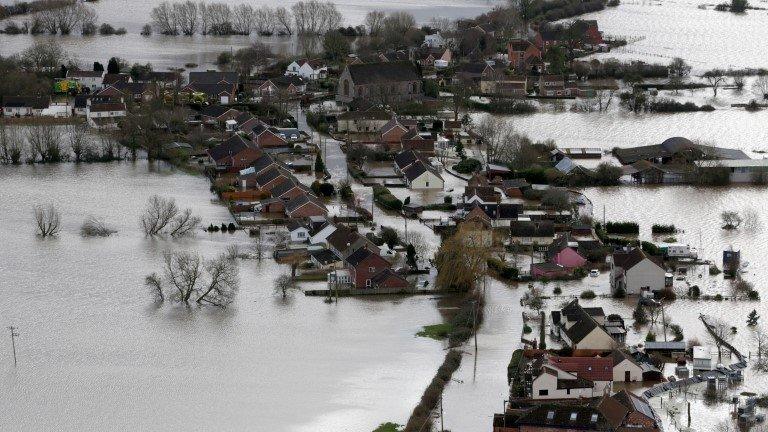Ten years on, can Somerset be saved from flooding?
- Published
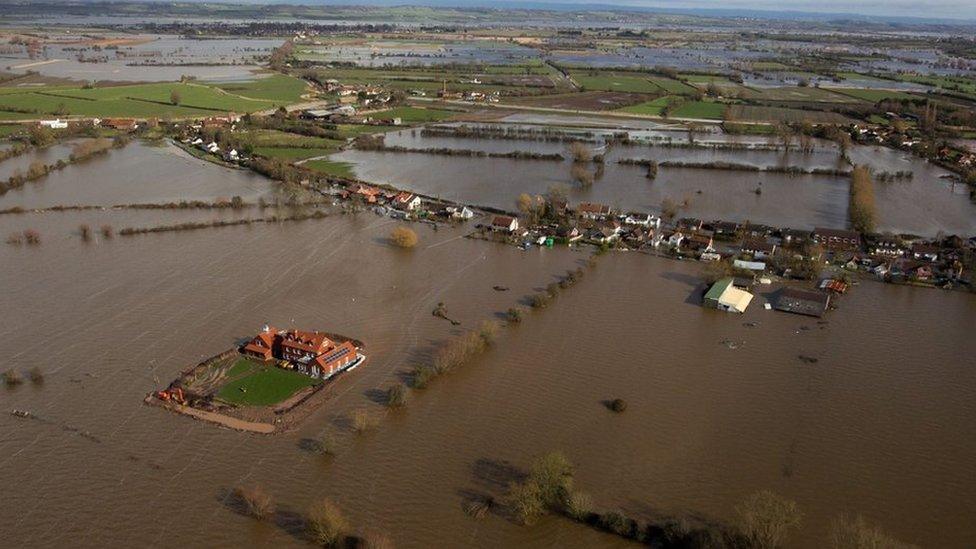
Most houses in Moorland, Somerset, were flooded in 2014, except one owned by a builder who dug his own defences
Ten years ago, Somerset suffered unprecedented flooding. Whole villages were completely marooned and hundreds of people had their homes swamped.
Millions have been spent since then building stronger flood defences, and this winter they were tested again.
Another very wet winter saw record rainfall in one of the lowest-lying areas of the UK, the Somerset Levels and Moors.
As climate scientists predict wetter winters and greater flood risks, Somerset is seen as a test case of how possible it is to prevent flooding.
What happened in 2014?
On February 5 2014, a police helicopter hovered over the village of Moorland.
"Flood danger imminent," residents were told by the Skyshout system. "Evacuate immediately."
Many people had left already, and by the end of February, 165 homes had been wrecked by floodwaters.
More than 25 square miles of Somerset was under what officials estimated was 100 million cubic metres of floodwater
Dozens of roads were closed and hundreds of animals had to be moved. The council put the cost of the damage at £118m, external.
Huge pumps were shipped in from the Netherlands while Royal Marines went out in boats to rescue villagers, mounted police patrolled abandoned flooded houses.
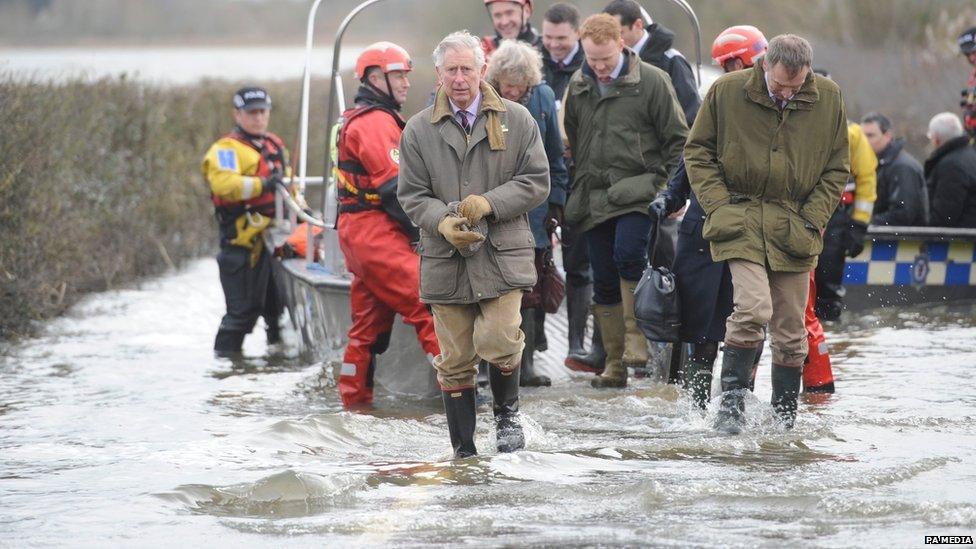
Prince Charles, as he was then, visited Muchelney in Feb 2014 by boat, the only way in at the time
Prince Charles visited the stricken villages, which had become islands in the waters.
He said it was a "tragedy that nothing has happened for so long" in terms of flood prevention.
The Prime Minister, David Cameron, came too, and vowed to do "whatever it takes" to make sure it never happened again.
What defences were improved?
The most visible change is the road into the tiny, ancient village of Muchelney. The name means "great island" and all four roads into the village were submerged under deep water in 2014.
This was hardly new. In the 12th Century, William Malmesbury remarked on the famous abbey that "in summer it may be reached by horse, but in winter - never".
Ten years ago, Prince Charles arrived by boat.
This year, the waters rose once again, and three of the four roads into Muchelney were closed, but the the causeway across the moor to Drayton stayed dry.
Why? It had been raised 1.5 metres, in work commissioned by the newly-formed Somerset Rivers Authority (SRA).
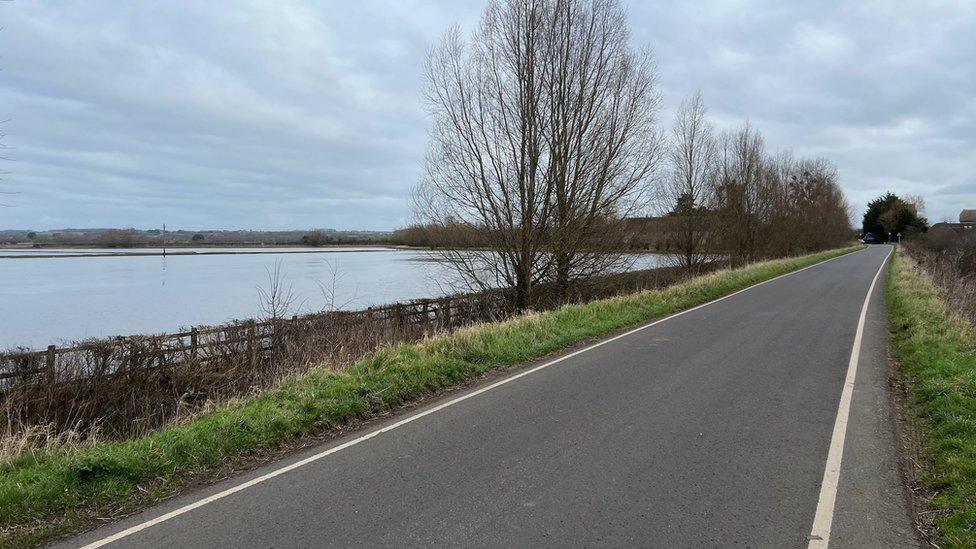
The road to Muchelney, raised in 2015 at a cost of £1m, stayed dry this winter next to flooded fields
Councillor Mike Stanton, who chairs the SRA, was pleased and relieved.
"We had the highest rainfall for 10 years, and the road was raised high enough to stay dry," he said.
Further along the River Parrett, which drains much of the Somerset Levels, huge pumps rise out of ditches dug a century ago.
These pull water out of the moors into the river. But they can only do that if the river itself is low enough, and that has been improved by substantial dredging, one of the big campaigns of the flooded residents.
"We did get the rivers dredged, that was our key campaign," recalls Bryony Sadler.
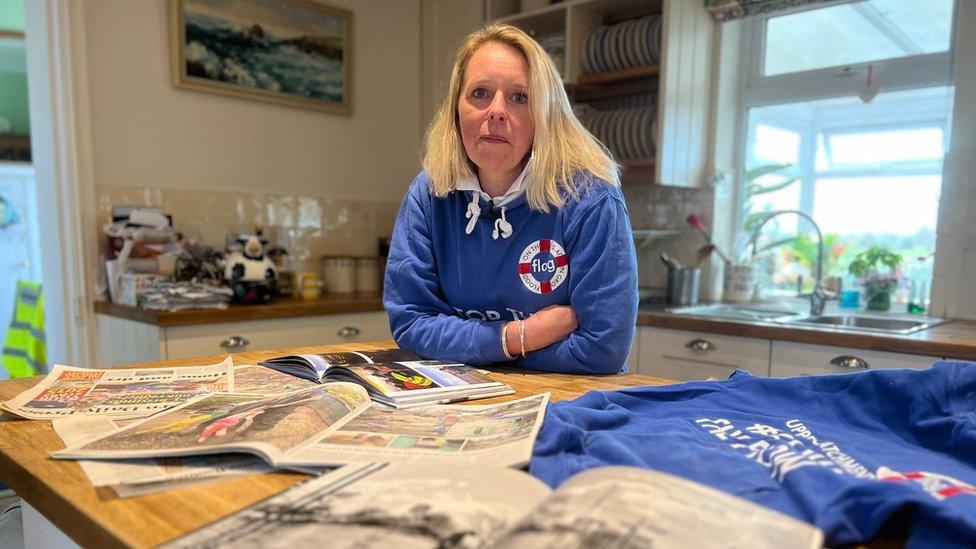
Bryony Sadler with some of the hundreds of press reports covering her work in 2014
Like many who live in Moorland village, Mrs Sadler left her home the day the police helicopter circled overhead. When they returned nine months later, they found much of it wrecked.
This week, I met her outside as she fed a handful of chickens her family keeps.
"We were a chicken business," she recalls. "We had over 100. But they didn't survive - chickens don't like water."
She threw herself into campaigning, joining a new group called Flooding on the Levels Action Group (FLAG).
Eventually, the Rivers Parrett and Tone were dredged following their lobbying.
Other flood defences have been built, and work has begun on a £100m tidal barrage downstream at Bridgwater.
Did the defences work this year?
So much rain fell on Somerset in December 2023 that once again a "major incident" was declared by the Environment Agency, external.
The agency says all of its new plans were followed on the levels, and "few properties experienced flooding".
Moorland village itself certainly stayed dry.
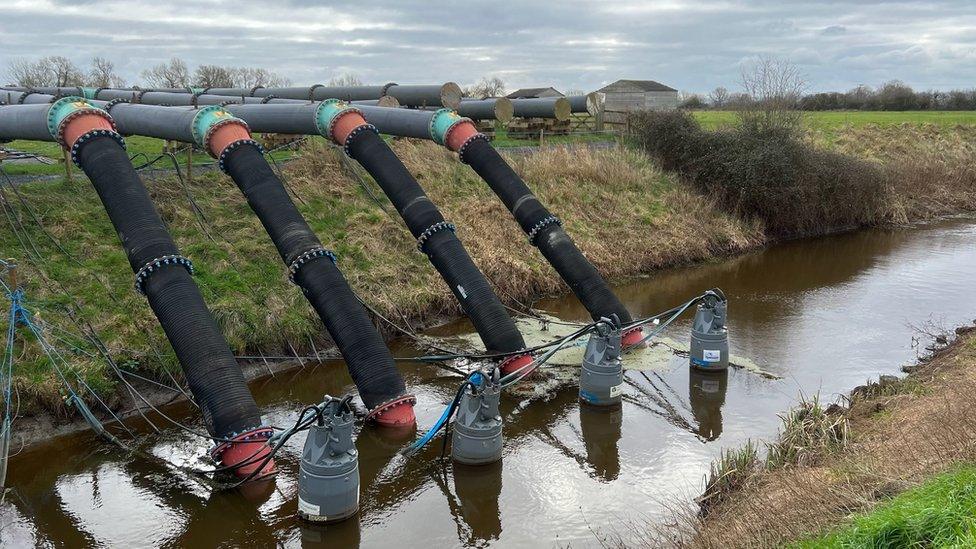
Huge pumps take water from drainage ditches and empty it into the River Parrett
"I think we're in a much better place than we were 10 years ago," Bryony Sadler told me.
"We've had lots of work done - lots of dredging, lots of pumping.
"There's lots more maintenance to be done, and more dredging, but things are much better."
But flooding, like lightning, rarely strikes in exactly the same place twice.
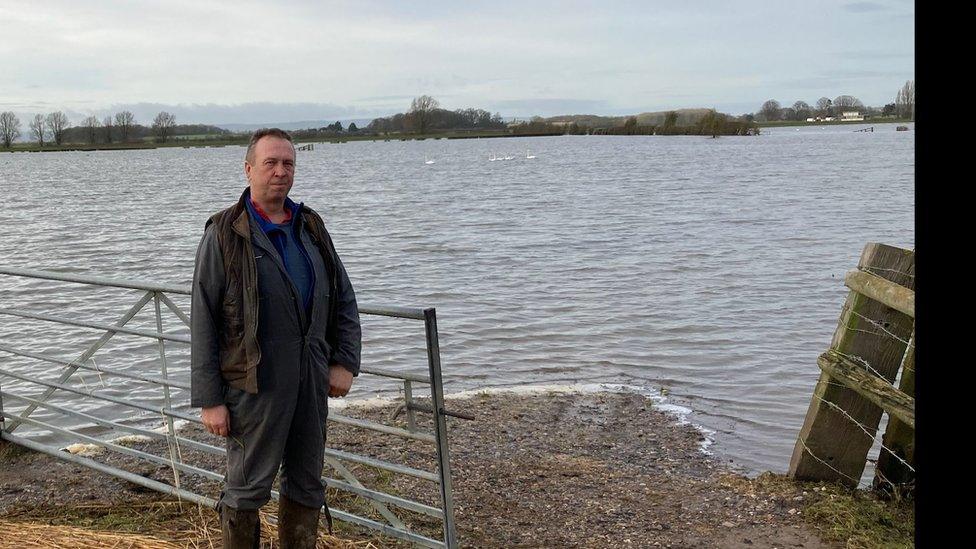
Mike Curtis has had 250 acres of pasture underwater for three months
The people suffering this year are further upstream.
Just outside Muchelney, Mike Curtis drives me down sodden farm tracks to the new lake that has appeared on his farm.
"There's 250 acres of grassland there," he shows me ruefully.
"It's been underwater since November - three months."
Mr Curtis accepts that much of his low-lying farm floods in the winter. What is unusual this year is how deep the water has been, and how long it has stayed.
When I visited his farm, it was three weeks since the last heavy rains, but much of it was still submerged.
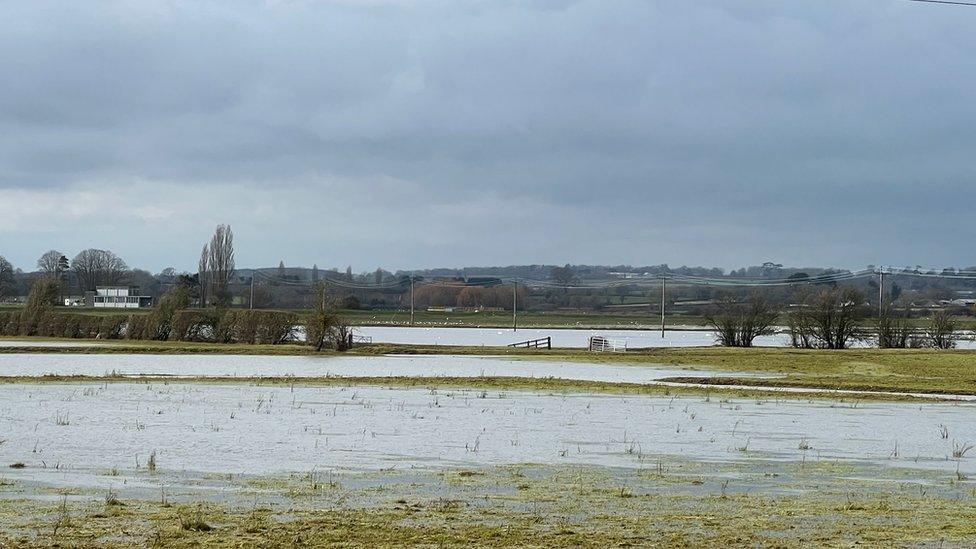
Three weeks after the heavy rains, this farm is still mostly flooded
And Mr Curtis thinks this is not just bad luck - but planned.
"The authorities have to keep Moorland and the residents downstream dry, so they're holding the water back with us.
"Basically our businesses are being sacrificed to save the residents further downstream."
Is it true? After all, his house has not been flooded, only his farmland.
The Environment Agency's job, officially, is to protect "people, then property, than land" - in that order.
And when I met Mr Stanton, he was keen to tell me of the "slow the flow" work.
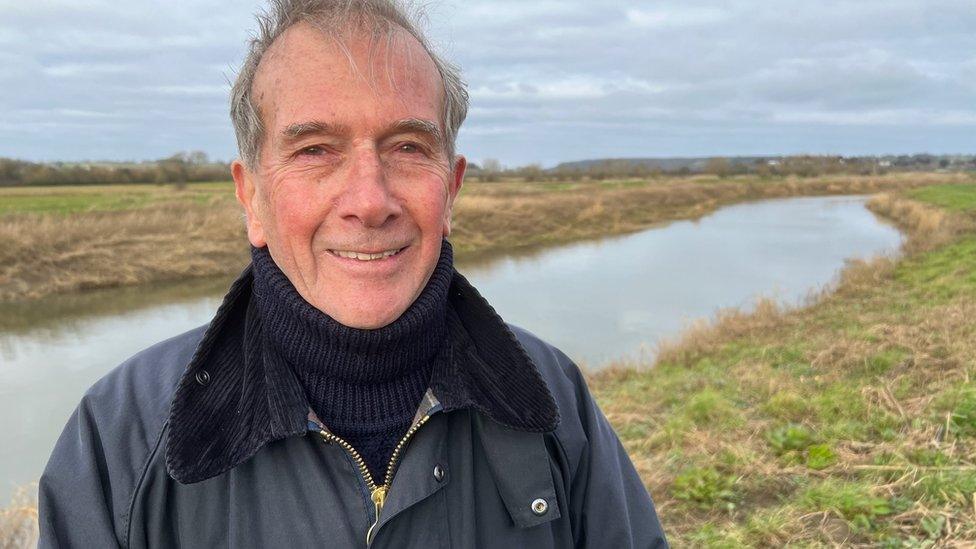
Councillor Mike Stanton, chairman of the Somerset Rivers Authority, says flood defences are working
Hundreds of small interventions have been designed to keep the water upstream, for longer, to avoid the downstream deluge they saw in 2014.
These include small, leaky dams, retention ponds and new hedgerows and trees
"Holding back the water further upstream is the real way to reduce flooding," said Mr Stanton.
I asked him whether farms upstream had been, in Mike Curtis' words, "sacrificed" to keep Moorland dry.
He said: "The plan is certainly to hold the water further up, but the consequence of any bit of flood defence work that you do, is it tends to move the problem somewhere else. Although this year the rain also fell in different places, that's another reason too."
Will flooding happen again?
Yes, according to scientists monitoring the UK's climate.
"Our climate is changing already," Prof Lizzie Kendon, a climate scientist at the Met Office, and Bristol University, told me.
Prof Kendon analyses patterns of rainfall in intricate detail, running sophisticated computer models to predict how a warming climate will change the weather.
She said: "Five out of the 10 wettest years on record have happened since 2000. And those records go back to the 1860s."

Expect wetter winters, drier summers, says Prof Lizzie Kendon
A warmer planet tends to produce wetter winters and drier summers for the UK, she explained.
She also expects more "clusters" of very heavy rainfall, such as the UK experienced this winter.
"The areas that are currently prone to flooding are likely to see more flooding in the future," she said.
Numerous climate predictions suggest trouble ahead for the Somerset Levels, which is both low lying and close to the coast.
And Mr Stanton is sanguine about how much flood prevention can hold back the waters.
"All those predictions are already coming true," he said.
"More rainfall, more flooding, sea levels rising - you can see that over the last 10 years.
"We're fighting a successful defence. But sooner or later, there'll be a big torrential downpour, and it will overwhelm even the defences we've got in place now."

Follow BBC West on Facebook, external, X, external and Instagram, external. Send your story ideas to: bristol@bbc.co.uk , external
Related topics
- Published31 January 2024
- Published4 February 2014
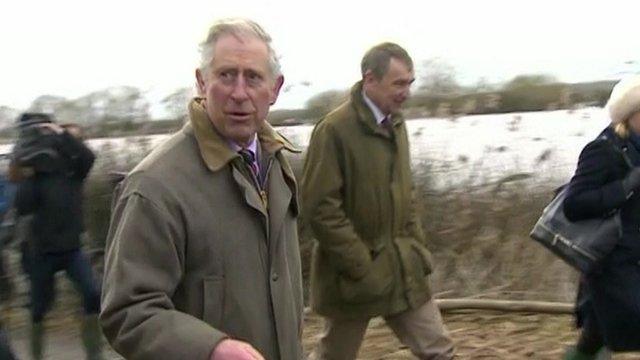
- Published5 February 2014
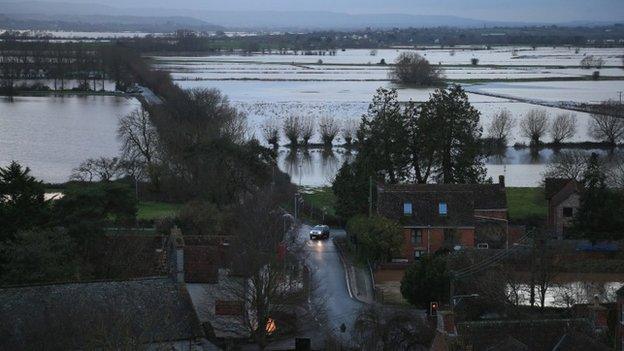
- Published6 March 2014
